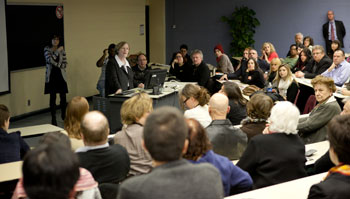Recording a grisly history
It was horrid: In 2002, Port Coquitlam, B.C., farmer Robert William Pickton was arrested and soon charged with the murder of six women, although authorities believe he actually abducted and killed 49 sex-trade workers from Vancouver’s Downtown Eastside from the 1990s to early 2000s.
For the next year, a team of more than 100 forensic experts and students sifted through dirt on Pickton’s property. They were searching for bits of human remains and other clues to identify the young women he had killed, cut up and discarded in various ways. They discovered buckets full of severed heads and hands. Enough scraps of human flesh and bone were found to identify 26 victims.

The ensuing preliminary hearings, voir dire, trial and appeals lasted until 2010, when the Supreme Court of Canada rejected a request for a further appeal. In the end, Pickton was found guilty on six second-degree-murder counts and sentenced to life in prison with no possibility of parole for 25 years.
Only one journalist covered the case from start to finish: Toronto-based investigative reporter and author Stevie Cameron, best known for her 1994 exposé, On the Take: Crime, Corruption, and Greed in the Mulroney Years (MacFarlane Walter & Ross).
Cameron described the case’s particulars to a standing-room-only crowd of about 125 Concordia students, faculty members, alumni and other guests on March 9 in the Henry F. Hall Building’s Room 407.
She recounted the process of gathering details over the course of nearly a decade in British Columbia. Despite the awful subject matter, “It was the best experience as a writer I ever had,” she said. “And it was a great change from covering politicians — serial killers don’t sue.”
The time, effort and expense — Cameron financed her own costs after her advance ran out — resulted in two books: The Pickton File (Knopf Canada, 2007) and On the Farm: Robert William Pickton and the Tragic Story of Vancouver’s Missing Women (Knopf Canada, 2010).
For the second volume, she explained, “I wanted to tell the story of the 65 girls,” the number of women who went missing from Downtown Eastside during that time (even though Pickton is linked to only 49). The down-to-earth Cameron added that many of the women came from “good families,” although most had been abused or neglected and many were drug addicts who took to prostitution to pay for their habits.
She related that while the prosecution had enough evidence to try Picton on 26 murders, they opted for six because of time and expense. Unfortunately, the trial judge proved to be inexperienced and ended up throwing out much solid evidence. Also, one of the jurors apparently questioned Picton’s guilt, which is why the jury only convicted him of second-degree murder.

In the question-and-answer period, Cameron was asked if she felt there was any cover-up or corruption that led to the relatively light sentence. “No, it was just incompetence,” she answered.
However, she only had good things to say about the police and the others involved in the long process. “There were literally hundreds who worked on the case, and they were great people,” she said.
Cameron spoke as part of the Reader’s Digest Annual Lecture Series in Journalism, which was sponsored by the Reader’s Digest Foundation of Canada and Concordia’s departments of journalism and English.
Linda Kay, chair of the Department of Journalism, welcomed the guests to the event, while award-winning journalist Andrew McIntosh, BA 97, who performed research for On the Take, introduced Cameron.
“Stevie was one of my mentors. She taught me to treat everyone with respect,” McIntosh said.
Related links:
• Reader’s Digest Annual Lecture Series in Journalism with Stevie Cameron
• Stevie Cameron’s website
• Concordia Department of Journalism
• Concordia Department of English